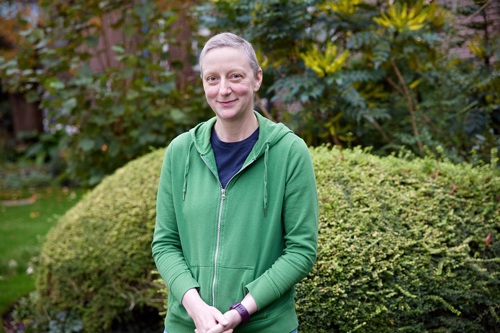Press release posted 3 January 2022
A patient from Ely in Cambridgeshire is one of the first people in England to have NHS proton beam therapy for breast cancer as part of a pioneering clinical trial.
The proton beam therapy (a specialised form of radiotherapy using proton particles rather than X-rays) is provided at The Christie NHS Foundation Trust in Manchester, the first of 2 NHS high-energy proton beam therapy centres. The other NHS high-energy proton beam therapy centres is at University College London Hospitals (UCLH), which is also involved in the trial.
The PARABLE trial will compare proton beam therapy with conventional radiotherapy for treating breast cancer patients who are at higher risk of long-term heart problems after radiotherapy treatment.
The trial will determine the effectiveness of proton beam therapy and whether it reduces the risk of cardiac side effects from radiotherapy amongst the target group of patients who have existing heart concerns.
PARABLE aims to recruit 192 patients from as many as 22 recruiting centres when fully open. Accommodation will be provided for those travelling far from home.
Kim Jones, 44, a school caterer from Ely, was diagnosed with breast cancer in February 2022 after noticing some thickening of the skin and painful twinges in her left breast. Her GP referred her for urgent scans at the breast clinic, and after having mammograms, ultrasounds and biopsies, the diagnosis was confirmed.
Kim was then referred to Addenbrookes Hospital in Cambridge, where she had chemotherapy followed by a mastectomy and lymph node removal. Following acceptance to the PARABLE trial, Kim's proton beam therapy commenced at The Christie on 24 October 2022.
Kim said: "I was told I might be suitable to participate in the PARABLE trial as it would potentially benefit patients with a high risk of long-term heart complications. As I already had an issue with my heart, the trial seemed like a great idea.
"When I was told that I'd been accepted onto the trial, I felt very lucky to have the opportunity to get this treatment. Clinical trials are incredibly important as they are the best way to evaluate which treatments work the best.
"The proton beam therapy centre at The Christie is bright and spacious and feels very relaxing. My experience of being treated at Addenbrooke’s and now at The Christie has been superb. The staff are wonderful and seem to have thought of everything. Their care is second to none, and I feel completely safe in their hands."
Following the proton beam therapy, Kim will have further treatment at Addenbrookes.

Kim is married to Mark, and they have two boys, Dylan, age 14, and Elwood, age 11. She enjoys walking, reading, live music and spending time with her family. Her father was successfully treated for kidney cancer in 2016.
Dr Carmel Anandadas, consultant clinical oncologist, from The Christie added: "It is important to recognise that conventional radiotherapy is very safe and effective with exemplary outcomes for the vast majority of breast cancer patients.
“We are excited to be able to offer the first NHS proton beam therapy treatments to breast cancer patients as part of the PARABLE trial and were very pleased to welcome Kim to The Christie for her treatment.
"We hope proton beam therapy will allow doctors to deliver the required dose of radiotherapy where it’s needed, while minimising the dose of radiation delivered to the heart, and without increasing the risk of early side effects such as skin redness and changes in breast appearance."
The PARABLE trial is being led by The University of Cambridge, The Institute of Cancer Research, London, and The Royal Marsden NHS Foundation Trust.
The trial is managed by the Cancer Research UK-funded Clinical Trials and Statistics Unit at The Institute of Cancer Research (ICR). It is funded by a National Institute for Health and Care Research (NIHR) and Medical Research Council (MRC) partnership. The NHS proton centres – UCLH and The Christie – also provided expert guidance on the trial protocol development.
Every year in the UK, more than 30,000 people with breast cancer receive radiotherapy following surgery as part of their treatment. Standard breast cancer radiotherapy uses high energy X-rays to kill cancer cells. As well as lowering the risk of cancer coming back, radiotherapy can increase survival rates.
Standard breast cancer radiotherapy is very effective for the vast majority of people and the benefits far outweigh small side effects. However, there can be a very small risk of radiotherapy leading to heart problems much later in life (less than one per cent of people treated).
The risk of heart problems later in life due to breast radiotherapy may be higher than one per cent for a very small group of people. This is usually because their breast tissue and the lymph nodes which require radiotherapy treatment are located close to the heart, and/or because they have an increased underlying risk of developing heart problems later in life.
Patients will be randomly allocated to receive standard radiotherapy or proton beam therapy.
The innovative trial will measure radiation dose delivered to the heart as an early predictor of possible heart problems, to avoid the need for lengthy follow up for many years before results are available.
People in the trial will also record their experiences using questionnaires so that researchers can assess side-effects including skin reactions, breast pain and swelling, and other symptoms which are particularly important for patients.
Find out more about the PARABLE clinical trial on the Institute of Cancer Research website.
